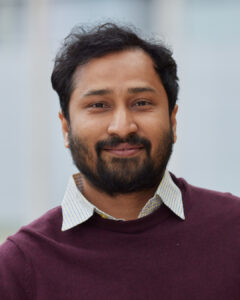Pikesh Pal’s Interview
Starting date: 15.08.2022
Nationality : Indian
Implementing Partner : Forschungszentrum Juelich
Main supervisor: Dr. Yixi Su

Few words about you and your research project
I am Pikesh Pal, recently joined as GNeuS postdoctoral fellow to the neutron method group (JCNS4), hired by Forchungszentrum Juelich, and working at MLZ.
My proposed work deals with emergent novel phases of quantum material in extreme condition. The tuning of quantum states of matter under combined environment like ultra-low temperature, high pressure and magnetic fields with microscopic neutron scattering probe has become most versatile approach to explore quantum condensed matter. Many of these states can be manipulated for harnessing their capability to advance technological applications
I also proposed to work on the optimization process of high-pressure research capability of DNS instrument at MLZ.
My non-academic secondment will be at SwissNeutronic AG, Switzerland. We proposed to jointly work on the optimization of the efficiency of the diffuse neutron scattering spectrometer DNS at MLZ with polarized neutron. This will help to step forward towards next upgradation of DNS.
What is your background? How have you heard about GNeuS?
I formerly worked as Ph.D scholar at National Institute of Technology Rourkela, India. My field of research was synthesis and characterisation of magnetoelectric multiferroics for structural, magnetic and magneto electric correlation in both bulk and nanoscale. I used neutron diffraction technique at DHRUBA, Bhaba Atomic Research Centre, Mumbai, India. (Further information available on ResearchGate).
I heard about the GNeuS postdoctoral fellowship program, firstly from Prof. Dr. Reiner Zorn (Organiser of the 23 JCNS Lab course). I was then able to find further information on Researchgate, neutronsource.org, and euraxess websites.
Why did you apply specifically on GNeuS?
I was looking for a postdoctoral training program which can help me to establish myself as beamline scientist with primary research focus on quantum condensed matter.
GNeuS answers perfectly my expectations as I found it is a perfect and compact postdoctoral program for an early career researcher who wants to establish a future career as a neutron scientist.
What impacts do you expect from the GNeuS fellowship?
In this training program, I proposed to have different secondments to gain experience with the neutron scattering techniques. The academic secondment provides the scope to have outstanding research experience in the field of quantum materials that can be promising for technological applications like proposed spintronics devices.
In the non-academic or industrial secondment, I planned to work at SwissNeutronic AG, Switzerland to be the part of next proposed upgradation process of DNS instrument. I expect the training program will help me to grow as a neutron scientist having capability of collaborative research in academia-industry-large scale facility trio to serve the society.
